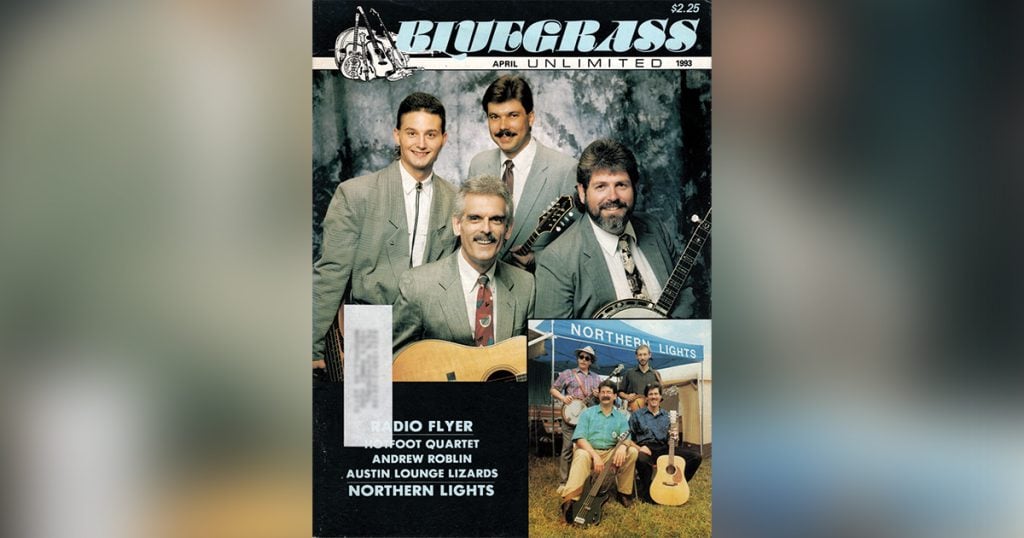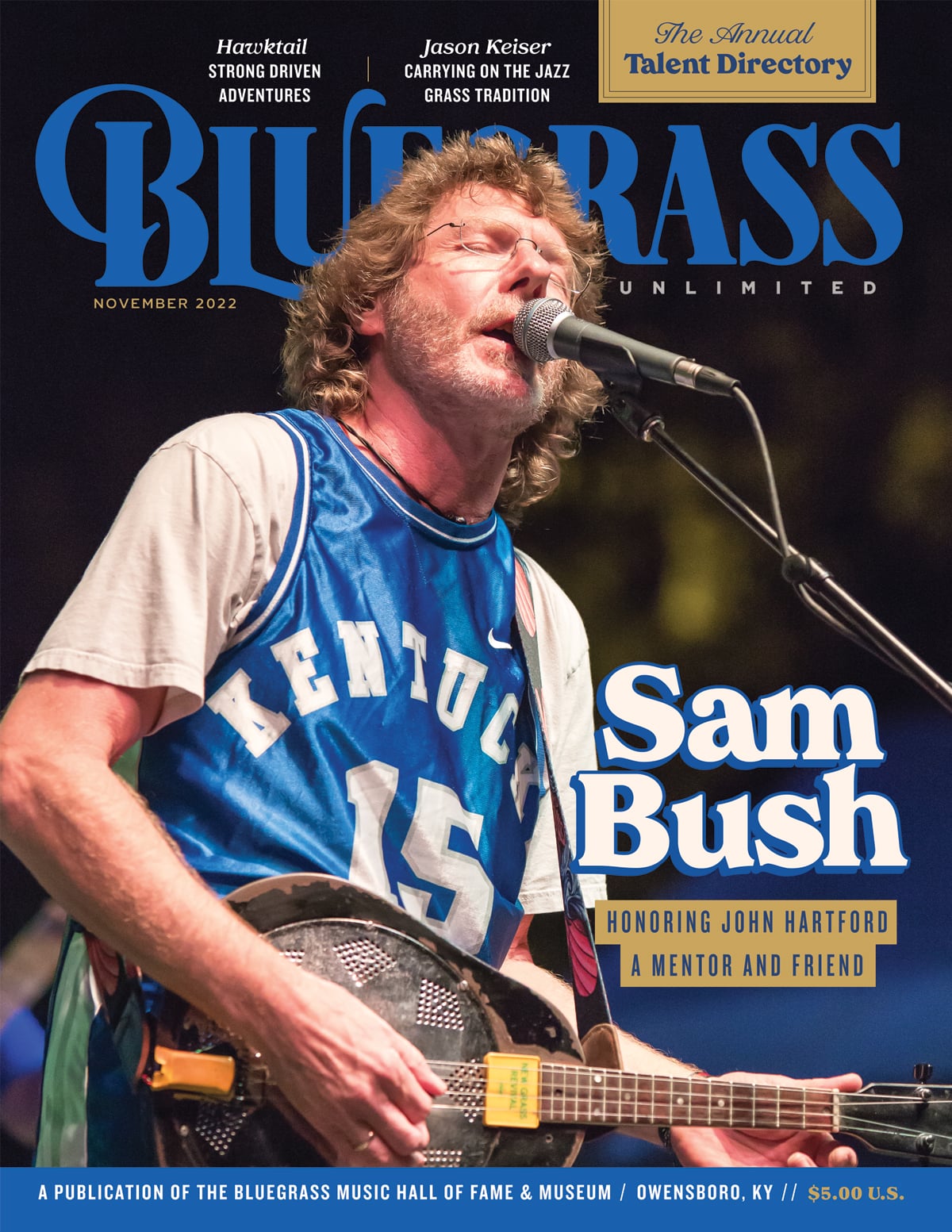Home > Articles > The Archives > Radio Flyer—Flying To The Top
Radio Flyer—Flying To The Top
Reprinted From Bluegrass Unlimited Magazine
December 1986, Volume 21, Number 6
If there were four people in Louisville’s Riverfront Plaza/Belvedere in September, 1985 expecting Radio Flyer to be named “Best New Bluegrass Band of 1985” at Kentucky Fried Chicken Bluegrass Festival, it sure wasn’t Radio Flyer.
After all, the year-old Springfield, Missouri band was following in some pretty prestigious footsteps: Stoney Lonesome, the band made famous on National Public Radio’s “Prairie Home Companion,” won in 1981; Los Angeles’ Grant Street String Band was named Best New Band in 1983. This was the festival Esquire magazine called the “most star-studded lineup on the festival circuit.” The French music magazine Backup called it “the mecca of bluegrass.”
In fact, Radio Flyer finished their competition set and modestly put their instruments back into their rented van, and were busying themselves with eating as much fried chicken as they could in the shortest time span known to man. It had been 14 hours since they’d eaten, jumped into the van, and driven like crazy to reach Louisville from Tulsa. “We’d been playing a show in Tulsa the night before, and we stopped in Springfield just long enough to pick up my wife and head out,” guitar played Dudley Murphy remembered. “I was coming down with some kind of horrendous virus, and everyone else took turns driving.”
They had figured they’d have just enough time to arrive, get some breakfast, and take showers before it was time to perform. Then, as the first rays of dawn broke over the horizon and Radio Flyer was barreling down the home stretch, the truth dawned on banjo player Roger Matthews’ wife Kate. “You know, I think we cross a time zone and lose an hour,” she told them. “It’s not 6, it’s 7!”
“I could just see us tearing down there with no sleep and nothing to eat, Dudley complaining all the way about me having my shoes off, and then getting there a half-hour late,” Matthews said. “We got out the map, figured out the mileage, and just kept on.”
The band found their hotel and managed to take showers, when they received the call from festival headquarters that it was time to draw lots to determine the order in which the contestants would play. Murphy’s wife Deanie asked the officials to draw for them and waited for the results. “I heard her say, ‘Oh, no,’ and put down the phone,” Dudley Murphy said. “She said, ‘You all are first.’”
Radio Flyer’s entrance onto the festival grounds rivaled something from the Blues Brothers. “We drove the van onto the mall, beep-beep, beep-beep,” Matthews said. “Someone said, ‘Are you Radio Flyer? You’ve got two minutes.’” “We were walking up on stage, trying to tune,” bass player Steve Duede remembered. “I was so hungry I was shaking.”
The huge crowd facing the quartet was awesome, after spending the past 14 hours packed into the van. “It was just a frenzy,” Murphy said. “We just decided to make the best of it; go out, play, and have fun.”
The group was pleased with their performance, but quite impressed with the bands who followed them. “Steve and I put our instruments away, and I just said, I’m going to eat chicken till I drop,” mandolin/fiddle player David Wilson said.
They hung around the hospitality room, and briefly pondered whether they should get their instruments out, just in case they would win and need to play the winner’s encore. “I thought I’d feel pretty embarrassed carrying my bass back in if we didn’t even place,” Duede said.
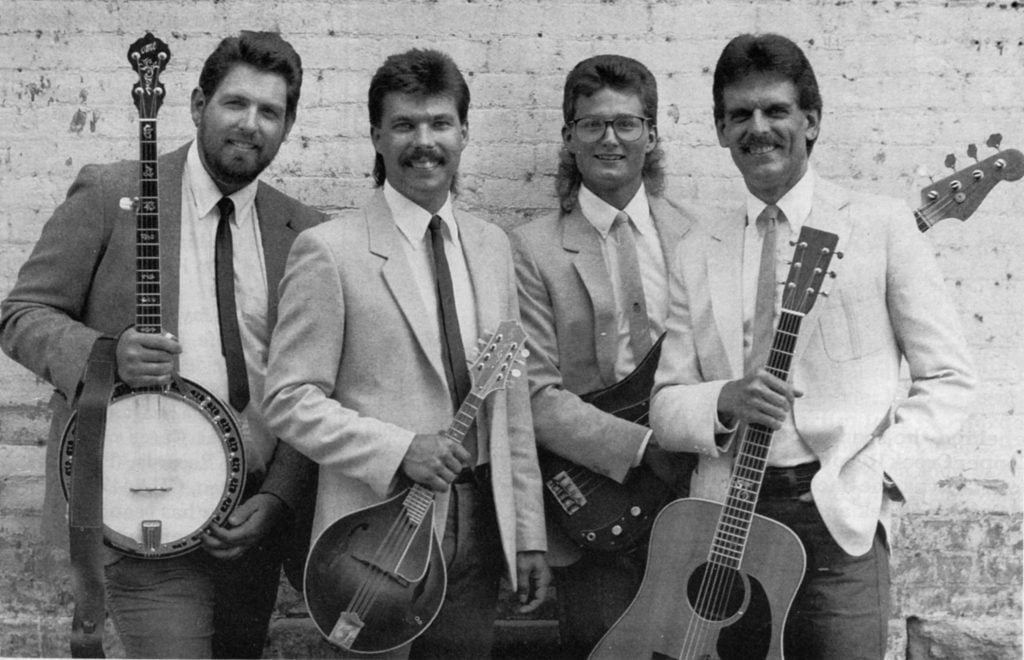
Luckily, they retrieved their instruments. But when KFC officials asked a representative from each band to come hear the results, Radio Flyer didn’t even send one. “Dudley was walking around, trying to relax, the rest of us were sitting around winding down, and my wife went to get some soda pop,” Matthews said. “She just happened to be walking past the room where they were making the announcement, and heard them announce our name. She came back and said, ‘Guess what —you guys won.’ I said, ‘Right, that’s enough humor.’”
Murphy was just outside in the hall when his old friend Wayne Bledsoe told him the news. “It hit me like a pro linebacker. Everything we could’ve done wrong, we did—except play poorly.”
If Radio Flyer didn’t expect a win, no one who has heard the band since they formed in October, 1984 was surprised. Murphy, Matthews and Wilson were all well-known musicians, the cream of the Ozarks bluegrass crop for years. Murphy had played as a duo with wife Deanie since 1971, and he and Deanie were both members of the band County Line for 12 years, playing in featured spots with many famous names. The band played with the Ozark Mountain Daredevils in 1976, the same year they cut the album “Sweet Prairie Hay.” In 1979, Dudley Murphy recorded the album “Twin Pickin’” with Adam Granger.
Wilson was a founding member of the highly acclaimed Ozarks bluegrass band the Undergrass Boys, which also recorded and played all over the country with big-name bluegrass bands. Matthews played in several area bands, including the Undergrass Boys. Duede, Wilson and Matthews all played in popular Ozarks country music shows.
“We all played the polyester music shows,” Matthews said. “We wore stretch polyester and said ‘gosh’ a lot.” Murphy, Wilson and Matthews talked about getting together to jam for five or six years before they actually did. When they finally set a date and met at the Springfield home of Matthews’ parents, they were stunned at the blend and complement they provided each other’s music. “I know everyone always says this, but it was magic,” Murphy remembered. “It pleased all of us; there was just a spark in the music.”
“What impressed me was the amount of originality in the band,” Matthews commented. All of the band members write music, and play a variety of musical styles.
“I was awed with the creative input,” Wilson said.
Wilson is the most prolific writer in the group, the other members agreed. Wilson said he is happy writing music for and performing with the band, although pushing his songs on the C&W circuit might be more lucrative.
“I know if I knew the right people, had some money behind me, I could make a lot of money,” Wilson acknowledges. “But given the timing, this is not a good time to take your song out and make something come of it. You’ve got the producer, the publisher, four or five different entities, all wanting a piece of the action before you get your money. I know if I wanted to spend my life doing that, digging and shoving, I could get one out there.”
Radio Flyer is a consummate ensemble. When things are going good, they’re incredible musicians. When things are going the best they can, the men seem more like separate fingers of the same hand than individual players.
During the rendition of the old bluegrass chestnut “Blue Night,” Murphy and Wilson turn toward each other instinctively, flipping off intricate triplet runs in harmony. Matthews smacks out a bluesy riff on the Ome he won as second-place finisher in the 1984 Walnut Valley Festival, then scrapes two fingers across the strings and screams out a slide. Wilson’s high tenor cries out a counter melody above his fiddle, and Murphy and Matthews join in like a piano chord on the chorus.
Duede on bass is a one-man show, head bobbing, nervous knees jiggling, right fingers fluttering excitedly between solid, effortless bass hits. “That boy’s nervous as a poodle pup,” Matthews says, shaking his head and chuckling.
The three other band members are as entertaining to watch as Duede. Matthews’ rubber leg flops time, and massive blond Ome bouncing off his large, flannel-coated stomach. Appreciating the sound. Murphy makes faces to Wilson’s perfect deadpan. “That’s all your insecurities coming out,” Wilson tells him.
Matthews, a long-time ventriloquist, is the official band funny man, and the rest egg him on at every opportunity. “We have to let Roger go wild at least once every practice, or we never get anywhere,” Murphy concedes. During a recent practice session, they encouraged him to tell the “car over the cliff story,” involving his new Ome, which he’d won only two weeks before.
“I was coming back from playing at the Shepherd of the Hills show (near Branson, MO.) in my old fiddle-playing grandpa’s pickup truck with R.A. Matthews painted on the side, and I had my banjo and dummy, Leonard Dugan, in the cab. I stopped at the convenience store in Notch, Missouri for a Coke and a microwave burrito, like all good fat boys will do. I was buying my burrito, and the lady said, ‘Oh, my goodness, someone drove off the cliff.” I ran out, ran right through the place where the pickup had been parked but didn’t know it, ran to a ravine and saw a truck with its wheels up in the air like a dead dog.
“I was beating on the truck, yelling ‘Anyone alive in there?’ and yelling to other people, ‘Hey, someone shine a light down here.’ They shone the light, and I saw on the side the words ‘R.A. Matthews.’ I got a lot of laughs on that one. Then I went looking for my banjo—I thought it would be in a million pieces, but I took it out and it was still in tune.”
Matthews called a wrecker, took out the Ome and sat on a street corner, playing the banjo, and waited for the wrecker. “Then I thought, I better call the police. The cop got there two or three days before the wrecker, and he was going to write me a ticket—they frown on cars going across Highway 76 without a driver—and I told him, ‘I’ll just go get Leonard out of the truck.’ The cop yelled, ‘Who’s Leonard?’ I said, ‘Leonard’s my kid; he’s been in worse than this.’ The cop’s freaking by this time, and I pulled Leonard out of the truck and brought him up to the cop. He had a ticket half-written, and he just put it away. He said, ‘A guy as crazy as you are doesn’t need any more trouble.’”
None of the Radio Flyer members are enthusiastic contest enterers, although Murphy and Matthews are both Winfield winners. Murphy won an NBN guitar in Disney, Oklahoma in 1971 and Matthews won a Stelling banjo in the Malibu Mountain Bluegrass Festival in Malibu in 1975. Of late, however, they had just about decided that contests are too nerve-wracking to bother with. “I won but I didn’t do well the next year so I gave up contest picking in favor of performing and occasionally judging flatpicking contests,” Murphy said.
The band broke their no-contest spell when they decided to send a demo tape to the KFC people. Then, when they were chosen as one of the Best New Band finalists, they decided the wrecked nerves would be worth it, and entered.
The group is especially proud of their new performance duds, sports jackets. “Roger came to one of our shows looking like he just came from a fish fry,” Murphy explains, “and we all went out and bought suits.”
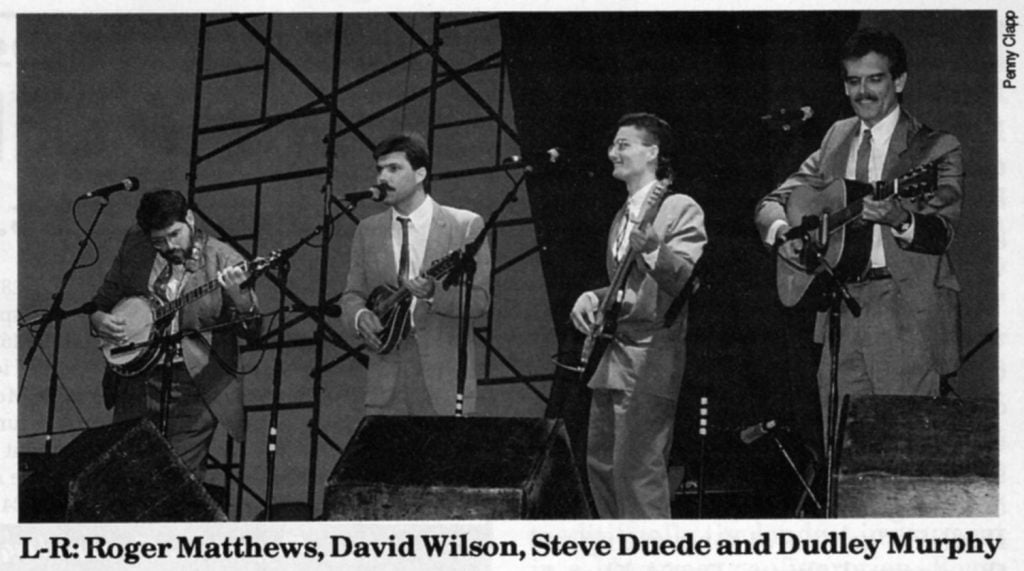
While they may not care for contests, they are wildly enthusiastic about their music. They described it as an eclectic blend of many musical disciplines, all based on a solid bluegrass foundation. “We even sat down and talked about this when we started,” Wilson remembered. “We decided to start with a bluegrass foundation and take the individual influences and pool them together.”
Anywhere throughout the Radio Flyer tune, you might hear a rock ’n’ roll riff running on the heels of a rhythm and blues ride or atop a reggae beat—but all places within the context of traditional bluegrass and gospel. “We’ve had the most success with obscure pieces,” Murphy said. “There are a lot of wonderful but obscure songs out there, and we try to be tasteful in what we select and how we arrange it.”
“I don’t think this group is afraid to go out on a limb,” Wilson added.
Murphy said Radio Flyer’s guiding principle is the preservation of their art. “I don’t think anyone wants to do anything to sacrifice our art. Of course, we need to remember that we’re entertainers. If we can put entertainment in our art, that’s great.”
Presently, the men are spending a lot of time on their vocals. They know they have a good blend in Matthew’s wide-ranging tenor/baritone, Wilson’s strong, rich tenor, and Murphy’s throaty baritone, and they want the combined instrument perfect. “I think people like vocals,” Matthews said. “I’ve been to concerts where there are all these instrumentalists playing licks for other people who play their instrument, not for the people who came to hear them.”
“Music communicates to the emotions better than any other art, and good vocals mimic emotions better than anything,” Murphy said.
All of the members of Radio Flyer hold down regular jobs they’re quite happy with. Murphy, 46, is a professor of art at Drury College in Springfield; Wilson, 31, and Duede, 22, teach private music lessons in a Branson, Missouri music store; Matthews, 31, is an optometrist going back to school for a degree in electronics.
They do hope to pick up enough festivals and concert gigs to keep a lot of their weekends busy, however. “We want to play a lot of music—festivals, shows, college campuses,” Murphy said. “We want to play the kind of shows you can bring your family to.”
Radio Flyer—A Band On The Cutting Edge Of The New Traditional Sound
By Nancy Cardwell
Reprinted from Bluegrass Unlimited Magazine
April 1993, Volume 27, Number 10
With their 1992 Turquoise release, “Old Strings, New Strings,” Radio Flyer, from Springfield, Mo., has once again drawn national attention to the strength of their original material, the stellar level of their instrumentation and their soulful, tight vocal arrangements. In fact, Wayne Bledsoe, bluegrass producer/host at KUMR in Rolla, Mo., and publisher of Bluegrass Now magazine says, “Radio Flyer may well be the most innovative and polished bluegrass band in the country today.”
David Wilson, on mandolin and fiddle, sings in a pure, high, free-flying manner that definitely puts the blues back into bluegrass in songs like “I’ve Got A Notion,” his original about getting along with one’s brother—rich or poor, black or white; Blind Willie Johnson’s “On Your Bond,” about death “slippin’ in the room;” and the newgrass-flavored “What You See Is What You Get,” another original.
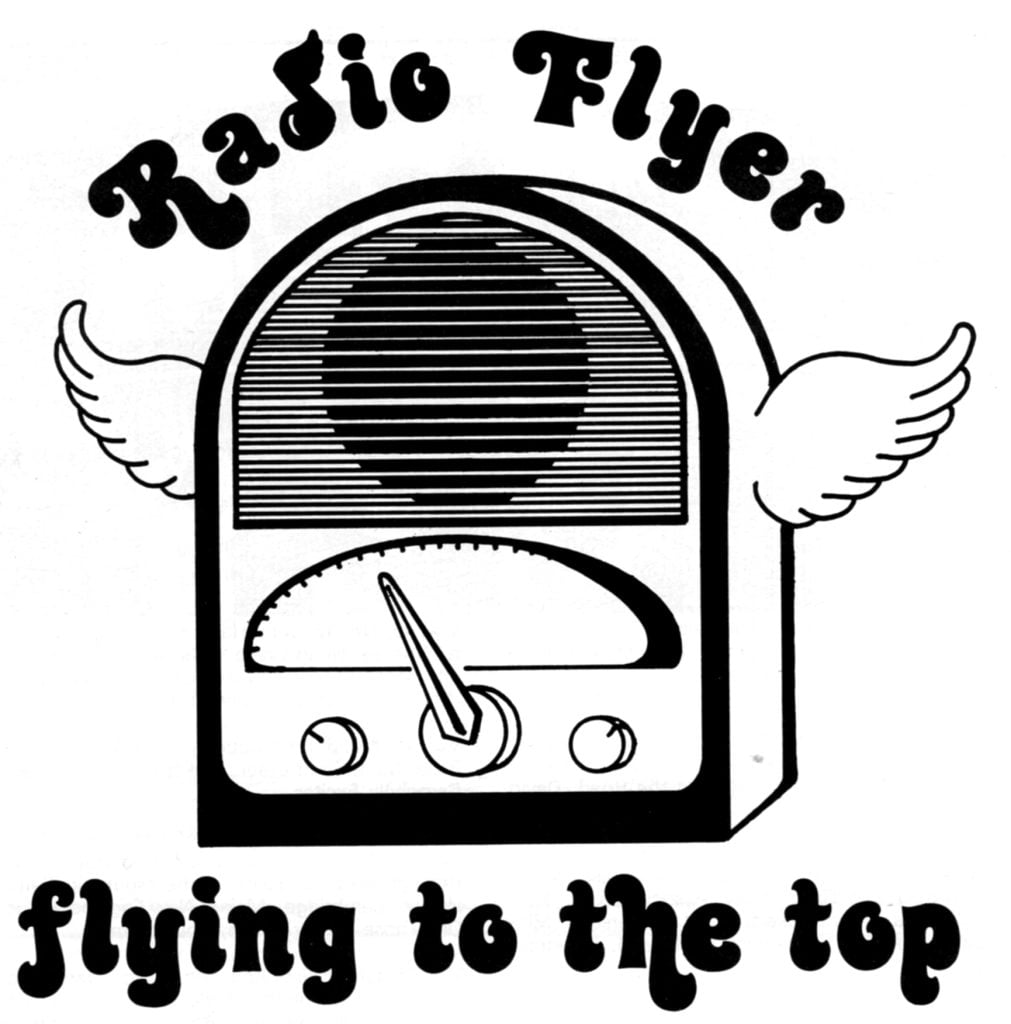
Dudley Murphy, one of the most sensitive and appropriate guitarists in bluegrass music today, demonstrates a poetic mind for song lyrics where strong visual and tactile images combine to form an overwhelming mood and mental setting for each of his compositions, like “Cornin’ Home,” which describes a midnight call to the singer’s mother to check on his Dad’s failing health, interspersed with memories of home. You can almost feel the chill in the air in anticipation of the season’s first snowfall in “Morning Always Takes My Dreams Away,” a melancholy nighttime look at the narrator’s future, alone.
Listeners won’t find any better groove setters in the business than what Radio Flyer achieves with the combination of Wilson’s steady mandolin chop, Roger Matthews’ barn-burning banjo and Steve Duede, who plays the electric bass with the ease of a master guitarist, (which he is). All Steve’s accents are in the right places and the bass line complements the melody line perfectly. Roger Matthews, whom Dudley says is “the funniest human being on earth,” is an excellent all-around banjo player, but his favorite bluegrass is the hard- driving, “traditional, lay your ears back and pick” stuff, Dave says. Roger writes instrumentals, like his popular “Second Derivative,” that could be among tomorrow’s standards.
The voices blend and the individual instrument voices weave together in exactly the right rhythm and harmony. The Radio Flyer sound reflects four individuals who are comfortable with each other musically and personally, no matter what groove the song takes them to. The group has been together since 1984, so that is an accurate observation.
“I enjoy the talent these guys have,” Dudley Murphy says. “They can do anything they want to on their instruments. Another thing I like is that we do write original music and it’s personal. I think everyone’s heart is in the right place for writing music.”
Dudley, Roger and David have known each other for about 15 years, through the extended bluegrass family of pickers and fans in and around Springfield, Mo. In fact, Dave Wilson was the first person Roger met the night he drove in with his family from Del Rio, Cal., to move to Springfield. He saw “Bluegrass” on the marquis of Shakey’s Pizza parlor on Glenstone Avenue where the Dalton Brothers were playing and Roger went in to ask directions from David, the first person he happened to see.
In 1984 Dudley’s band, County Line, had just broken up and the Branson, Mo., dinner theater Dave and Roger were working at had just gone under. So they met with bass player, Irl Hees, at Roger’s house “strictly to get together in the front room and to play for our own enjoyment,” Dave says. They started out just playing “straight ahead bluegrass stuff that we’d never gotten the chance to do together. From there, we wanted to see what kind of songs we could write.” Irl, who plays now with the popular Missouri band, Down The Road, left the group in the spring of 1985 and Dave began working on Steve Duede, a fellow teacher at a local music store, to join the band. “I talked Steve into borrowing a cheap bass from the store and playing,” Dave said. “I’ll never forget saying, ‘Steve, what are you going to do with your life?’ He was playing in a rock and roll group at the time—a pretty bad one…which was a shame, because Steve is an excellent guitarist.” With some borrowed Monroe, Stanley, Hot Rize and New Grass Revival tapes, Steve began to acquire a taste for bluegrass and joined Radio Flyer for their next three gigs in summer, 1985. Then in September the group showed up at the Kentucky Fried Chicken Festival in Louisville, virtually unknown and walked away with first place in the band concert.
From that point, their venues have expanded across several states, to include a number of college concerts, city festival and art council performances, bluegrass festivals and public radio station promotion shows. After their first release on the Turquoise label, “Radio Flyer,” in 1988, they received favorable reviews in Billboard magazine and Bluegrass Unlimited, as well as top-ten airplay on several nationally syndicated bluegrass radio programs. They also appeared on National Public Radio’s Mountain Stage in 1989.
Radio Flyer has recorded both of their albums for the Turquoise label—a decision and association they continue to be pleased with. “I have nothing but the highest respect and regard for Pat Martin at Turquoise Records,” Dudley says. “They are unquestionably one of the finest record companies in the bluegrass recording industry…Pat does so much for her artists that a lot of other companies don’t, that it’s enviable.”
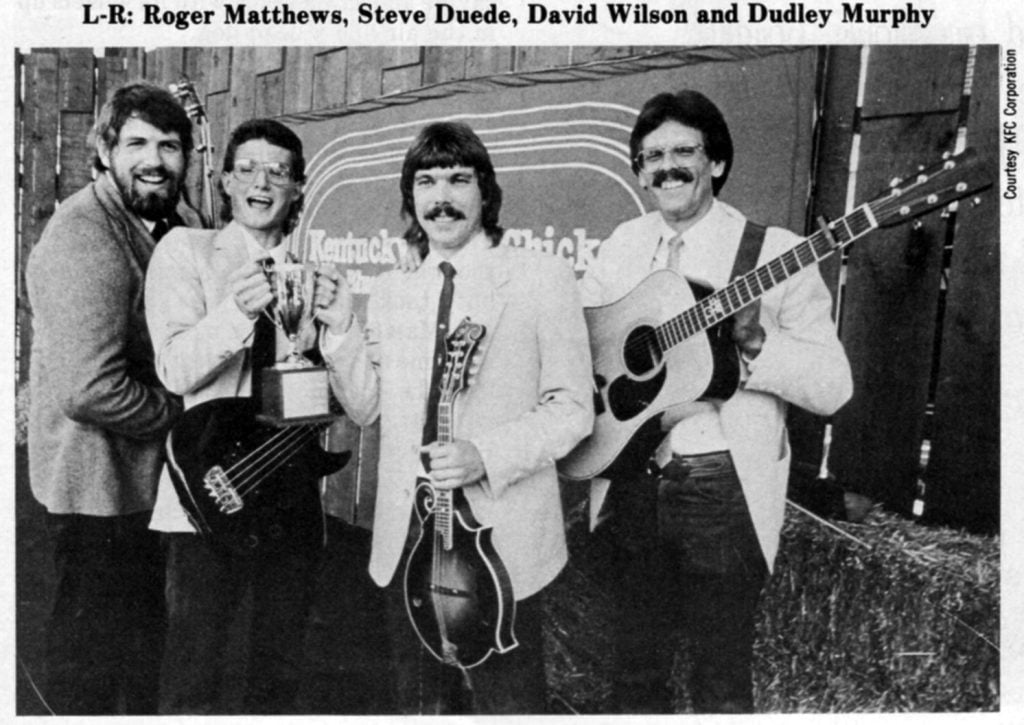
Dudley Murphy, an art professor at Drury College in Springfield, Mo., is from Kentucky, with a music background in folk and bluegrass. He plays a Santa Cruz guitar, uses John Pearse strings and a Mini-Flex Donnell microphone, which he says is “absolutely the best thing” for amplifying the true sound of an instrument.
David Wilson, from Springfield, grew up playing cello in school orchestras, as well as country music with his cousin’s band at Elks Clubs and local country music barns. He plays a six-year-old Nugget A-5 mandolin and he uses John Pearse strings. The instrument has “a throaty, wooden tone that works really well for my stuff,” he says.
Aside from Crosby, Stills, Nash & Young, Dave lists his longtime influences as Haydn, Chopin and Mozart, from the days when he was playing in string quartets. In bluegrass, he says he listened to Monroe for a long while and then Sam Bush. Local fans who have followed Dave Wilson’s music through the years know that he has his own recognizable style. Actually, it’s more of a touch—the approach he takes or the phrasing he uses on any instrument he picks up. Roger Matthews calls Dave a “consummate, awesome musician. He can go out on a limb farther than anyone I know and not fall in the creek,” Roger says.
Earnie Bishop, with Downhome Bluegrass, says it this way: “Dave can play Sam Bush or he can play Tim O’Brien. But I like him best when he’s just playing Dave Wilson.” And it’s practical, too, David says. “Back in the days when I was listening to all the faster mandolin players,” he says, “I felt like I was being paid by the note. So I always tried to see how many notes I could play! As I got a little older, I figured out that instead of playing 16th and 32nd notes all the time, I could play quarter notes and it paid the same. There have been a lot of people say that it’s the space between the notes that make the ride. I’m playing a lot less notes now and trying for something that has a little more meaning and depth to it.”
Steve Duede, originally from Iowa, has a solid background in rock ‘n’ and more recently, contemporary Christian music. When he was approached about playing with Radio Flyer, Steve recalls, “I didn’t know David very well and I didn’t know the other guys either. But I figured it would be a good chance for me to expand my musical horizons. I’d been teaching for so many years,” he explains, “and it’s important for me to be able to play different styles. But I mainly did it because I figured these guys were seasoned, professional musicians and I could learn a lot from them. I have grown musically a lot over the past several years as far as bluegrass is concerned,” Steve says, “and just in my overall playing.” Although he is the youngest member of the band, the other players deeply appreciate Steve’s contributions musically and also in the area of morale. “Steve is consistent to the bone,” Dudley says. “He is never deeply upset or frustrated. If he is, it just doesn’t seem to show. He is the most positive person in the group and probably the role model we’d all like to try to adopt.” Steve plays a 1963 Fender Precision bass with a GK amplifier. He also uses John Pearse strings.
Before Roger Matthews moved to Missouri, he picked some in California with The Cream Of Kentucky in Ventura and the Bluegrass Sheiks in Santa Barbara. In Missouri he worked with Powder Creek and the Undergrass Boys, as well as putting in several years in Branson shows and theme parks.
Roger is a civil engineer with the Missouri Highway Department. He also has a family and has worked as a student assistant DJ at KUMR on campus since 1987. With so many irons in the fire and living two hours away from the other band members, how does he manage to keep things together and what keeps him going? “Bluegrass is like a disease,” he confides. “I just like the sound of the banjo. I dream about it and I hear it in my head. While I’m contemplating problems of inertia and the radii of steel beams, I’m also mulling over a new tune I’m writing called ‘Diamond Back’” he says. “It’s going to be a real barnburner instrumental in the key of G.”
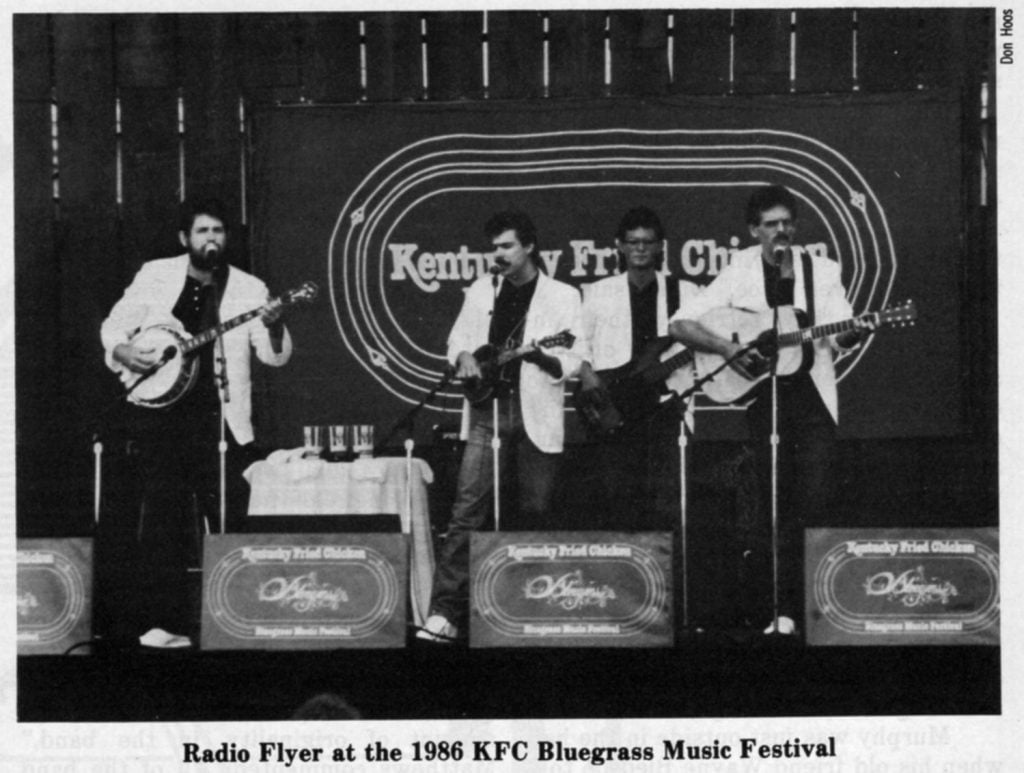
On the subject of his many commitments and interests, Roger says, “I don’t know if you would say I have it all or if I’m insisting on it all.” He credits the example of his father’s strong work ethic as an inspiration in his approach to music. “Life’s finite,” he comments. “Get what you can out of it. Grab it and growl!”
Roger took second place in the 1983 banjo contest at Winfield, Kans. He plays an Ome and also a 1927 Gibson Mastertone. He especially likes the sound of an ivoroid thumb pick along with old National fingerpicks, which he scrounges from coffee cans behind counters in older music stores. He says they were made from a different type of steel and were a little heavier. Roger uses a Kyser Elite capo and has switched recently from medium gauge to GHS PF 170 light gauge strings. They don’t rust if he wipes them down with a cloth after playing and he says they’re easier to do “Earl tricks” on. Roger had Kentucky banjo craftsman Frank Neat, convert his Gibson into a flathead. He also tore apart and fixed the neck and redrilled the pegholes so that it stays in tune better. As for inspiration, Roger says he admires Pete Wernick, “not just musically, but intellectually as far as playing the banjo.” He laughingly points out that most people think “the best lick is not to play it all on the banjo.” Knowing that the banjo is traditionally the loudest instrument in a bluegrass configuration, Roger says, “I pride myself on not stepping on Dudley’s guitar breaks.”
In the area of repertoire, Radio Flyer went through a period in the early years of doing several tunes by people that influenced them in the past—songs like “Wasted On The Way” and “All Along The Lee Shore” by Crosby, Stills, Nash & Young and some Bob Dylan music. “I think we’ve kind of found a middle ground now,” Steve says, “to where we’re comfortable playing our songs and mixing them with more traditional bluegrass songs.”
“Our music is probably maturing,” Dudley adds, “and it has more relevance to the industry than it did before. We’re more interested in bluegrass-type music, as far as our own writing; before it was pretty eclectic.”
Roger says, “We would like to come up with four or five tunes in our career that are good enough and traditional enough, that they would show up as cover tunes in other bands.” He says their sets now contain about 50% original material. He admires Dudley’s “genius” at songwriting and the unusual things David likes to throw in his music—like writing 4/4 tune with one measure in 3/4 or 5/4 time.
When asked about Radio Flyer’s original music, Dudley comments, “In any industry it’s a rule of economics that you don’t try to live off of your unrenewable resources. We’ve done that in bluegrass; to the point that ‘Uncle Pen’ is not favorably received anymore, or ‘Fox On TheRun…’ Somebody has to renew something. So in a way, without actually setting that as a goal to achieve, we are contributing some new resources.”
David and Dudley both have distinctly different writing styles. Roger favors instrumental compositions and he also brings a lot of old, obscure bluegrass tunes to the band’s play list. Steve is a prolific songwriter, but mostly in styles outside bluegrass. The members are sensitive enough to each other creatively, that they can spotlight whomever’s writing ideas are hot at the moment, in order to achieve a combination that works on stage and on records. “It’s like watching someone play basketball,” Dudley says. “When someone’s got the hot hand, you feed them the ball.”
Radio Flyer is a strongly supportive member of IBMA and is appreciative of the organization’s efforts to help bluegrass “gain more credibility in the music industry,” Dudley says. “I’ve been around bluegrass music for a long time, and I think it would probably be harder to break into the business now as say, a guitar player, (or on any other instrument, for that matter) than it was when I started. There are higher benchmarks to achieve. Back then it was ‘Anything goes.’ If a bunch of people got together and they played well together, they had a band. Bluegrass is a more professional business now and the shows are tighter. The acts rehearse more and they are better prepared.”
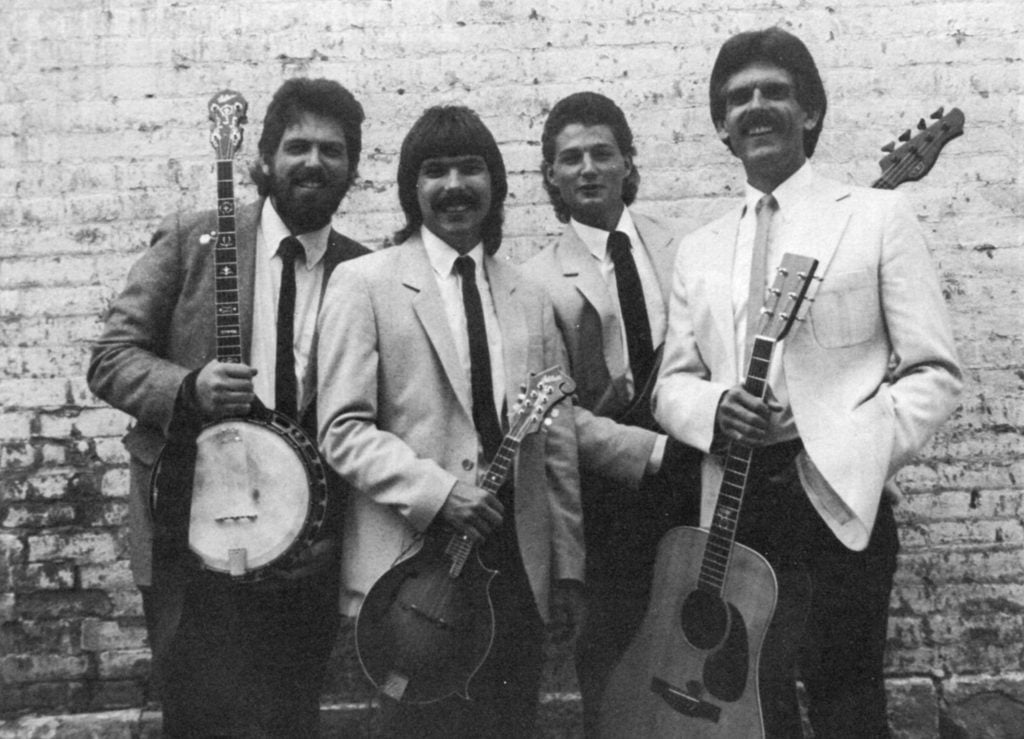
In retrospect, thinking back over the past seven years together as a band, Dudley says, “We have fun. There’s never a dull moment. We just enjoy being together.” He feels that the combination they have found is a gift. “In life it’s a real bonus if you find friends like this, let alone get to play music with them. We’ve reached a point of just enjoying one another—personally, musically, spiritually, and philosophically,” he continues. “So I can honestly say, without any reservation whatsoever, that we love each other. And I think if one of us is eliminated, by some stroke of disaster, from the ability to play, I’d almost say the band would break up. Because I think there’s something there that might not carry on with another group. We’ve talked about that and I know this is the last bluegrass band I’ll play in.”
In closing, the members of Radio Flyer make a point to thank promoters who have gone the extra mile in making them feel comfortable on the road, in areas of sound, lights, dressing rooms, etc.—people like Howard Epstein and Del Davis.
“Doggone it, the people who come to see the festivals want to see the musicians play well,” Dudley says. “And musicians are like anyone else. They’re like horses or dogs or cats. They do well when they’re treated well. And to put them in accommodations where they have to change in the back of a truck or in a flooded restroom—It’s really a concern with me.”
More and more folks are becoming Radio Flyer fans and the band members are also extremely thankful for the individuals out there in the audience. “I really appreciate all the people I’ve met in bluegrass,” Dudley says. “You go through life and maybe you see people, but you don’t ever have the time or opportunity or occasion where it’s easy to say ‘Thank you.’ I’d like to say that. There are some excellent people out there, all along the way at every level: players, listeners, people’s kids…They all lend something to what you are, certainly, so I’m appreciative of their support.”
Though they’ve been somewhat of a well-kept secret in the Midwest for the past seven years, if you haven’t heard Radio Flyer yet, trust me, you will. With the release of their second CD and more widespread bookings, the rest of the country is beginning to sit up and take notice.
Orin Friesen, host of the syndicated radio program, Bluegrass Country since 1973, has this to say about the band: “The guys in Radio Flyer are professionals all the way—in the way they pick, the way they sing, their great original songs, their creative arrangements and the way they present themselves on stage. If upcoming groups are trying to figure out how to do it the right way, Radio Flyer would be a great example.”
